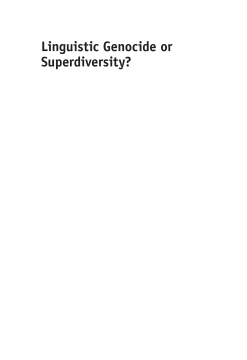
Additional Information
Book Details
Abstract
Are we facing an immense wave of language death or a period of remarkable new linguistic variation? Or both? This book answers this question by analysing studies of language endangerment and loss along with those of language change, revitalization and diversity. Using case studies from Russia and the EU, the authors compare historical language variation to that of the present day, arguing that accelerated language extinction can be considered a result of colonization, modernization and globalization, but so too can many new creoles, intertwined and mixed languages, new ethnic identities, new groups of urban dwellers or migrant groups, all with their own distinct cultural traits. The book therefore surmises that the linguistic heritage of today is simultaneously more endangered and more diverse than ever before.
This innovative collection provides a ground-breaking look at not only language loss, but also the emergence of new kinds of linguistic variation that develop in the context of language ecologies undergoing shift. An emphasis on case studies in the under-researched arena of languages in contact with Russian provides fresh perspectives in this invaluable volume.
In the mainstream of today's research of language endangerment, Linguistic Genocide or Superdiversity? is a refreshing and optimistic read against the gloomy background of dozens of books predicting the inevitable disappearance of all languages except English. With Foley's metaphor of 'language birth' in mind, the authors suggest interesting alternatives to another widespread metaphor, that of 'language death'.
Nikolai Vakhtin, European University at St Petersburg, Russia
Reetta Toivanen is an Adjunct Professor for social and cultural anthropology and a Finnish Academy Research Fellow at the Erik Castrén Institute of International Law and Human Rights at the University of Helsinki, Finland. Her main research interests are ethnic and language minorities, indigenous peoples, minority rights, revitalization and politics of recognition.
Janne Saarikivi is a Fellow at the Helsinki Collegium for Advanced Studies, University of Helsinki, Finland. His research interests include historical linguistics, sociolinguistics and Finno-Ugrian languages.
This volume constitutes an important intervention into linguistic and linguistic anthropological discussions about the nature of and prospects for linguistic diversity in a context of globalization. The editors of the book have worked to draw together the two primary – and seemingly opposite – approaches to understanding the contemporary global sociolinguistic landscape, and convincingly articulate the case for unifying the two ideas.
Sarah Shulist, MacEwan University, Canada
The book, with its multitude of case studies, represents a useful resource
for anyonewanting to gain a detailed insight into the wide range of diversities across
Europe.
Katharina Prochazka, University of Vienna, Austria
This inspiring collection of chapters thematizes ethnic and linguistic variation as they are experienced today in a variety of contexts characterized by accelerating urbanization, rising literacy and the spread of new media. The book campaigns successfully for a freshly optimistic perspective on the future of the world’s linguistic diversity.
Table of Contents
| Section Title | Page | Action | Price |
|---|---|---|---|
| Contents | v | ||
| Contributors | vii | ||
| Introduction to New and Old Language Diversities: Language Variation and Endangerment in Changing Minority Communities | 1 | ||
| Part 1 Language Communities or Networks of Communication? Old and New Linguistic Diversity | 19 | ||
| 1 Fragmentation of the Karelian Language and Its Community: Growing Variation at the Threshold of Language Shift | 21 | ||
| 2 What’s Up Helsinki?: Linguistic Diversity Among Suburban Adolescents | 65 | ||
| 3 Varieties of Erzya–Russian Code-Switching in Radio Vaygel Broadcasts | 91 | ||
| 4 Udmurt on Social Network Sites: A Comparison with the Welsh Case | 108 | ||
| Part 2 Standardising Languages and Ethnicities: Mission Impossible? | 133 | ||
| 5 A Tale of a City and Its Two Languages: A History of Bilingual Practices in the City of Bilbao | 135 | ||
| 6 Nationalising Fluid and Ambiguous Identities: Russia, Western Ukraine and Their Ukrainian and Russian Minorities, Diasporas and‘Compatriots Abroad’ | 159 | ||
| 7 Emergent Sámi Identities: From Assimilation Towards Revitalisation | 195 | ||
| 8 Localising the Global in the Superdiverse Municipalities of the Arctic: The Case of Inari | 221 | ||
| Part 3 Language Revitalisation: Protection Standards or Tolerance for Variation | 247 | ||
| 9 Russia’s Minority Education and the European Language Charter | 249 | ||
| 10 Metadiversity, or the Uniqueness of the Lambs | 284 | ||
| 11 Division of Responsibility in Karelian and Veps Language Revitalisation Discourse | 299 | ||
| 12 Standard Language Ideology and Minority Languages: The Case of the Permian Languages | 326 | ||
| Index | 353 |
